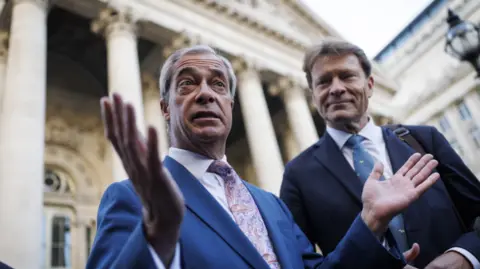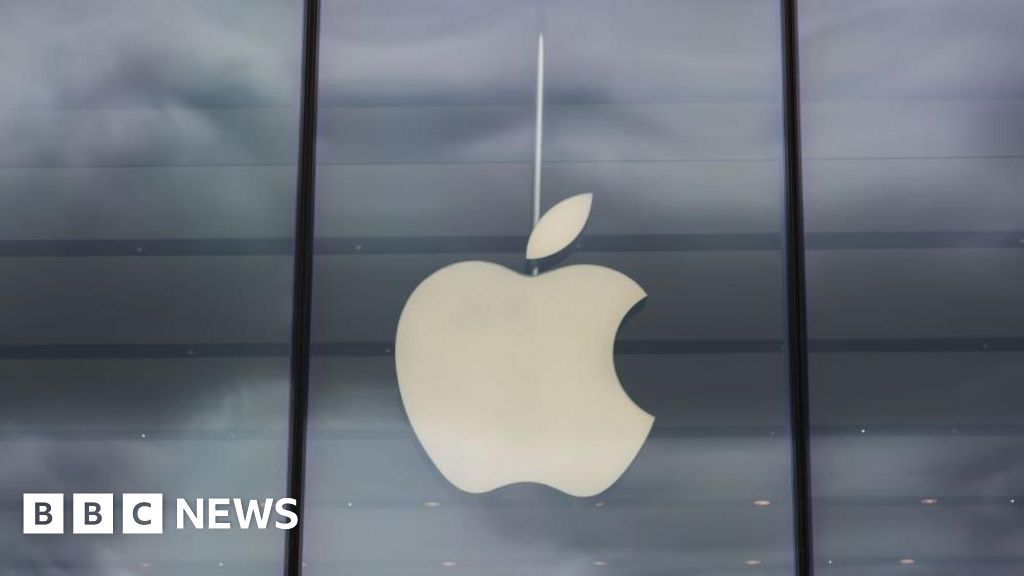Paul SeddonPolitical reporter
 EPA/Shutterstock
EPA/ShutterstockNigel Farage has escalated his calls for the Bank of England to halt its bond-selling programme, in his first formal meeting with its governor.
Reform UK argues the process, known as quantitative tightening, is saddling the taxpayer with billions in losses and pushing up government debt costs.
Its deputy leader Richard Tice, who also took part in the meeting with Bank chief Andrew Bailey, said Rachel Reeves needs “all the help she can get” ahead of her Budget at the end of November.
The pair also appealed directly to the Bank to relax its approach to cryptocurrencies, accusing it of holding back innovation.
The Bank began its quantitative tightening programme in 2022, unwinding the emergency support it brought in after the 2008 financial crisis.
That earlier process, known as quantitative easing, saw the Bank electronically create billions of pounds to buy UK government bonds, a form of debt, in a bid to prop up the UK economy by keeping market interest rates low.
The Bank subsequently launched new rounds of QE after the eurozone debt crisis, the Brexit referendum and the coronavirus pandemic.
The Bank is now in the process of selling these bonds for less than it paid for them, with losses being picked up by the Treasury under a deal agreed in 2009.
Reform has criticised the process, with Tice branding it a “systemic misuse of taxpayers’ money” in a letter to Bailey in June.
He also blamed it for increasing the costs of long-term government debt, which recently rose to a 27-year high.
‘Multibillion cost’
Farage and Tice met Bailey earlier, after the Bank chief agreed to a meeting.
Speaking to reporters afterwards outside the Bank’s Threadneedle Street HQ, Tice called for MPs to take a more active role in debating the policy, arguing they were reluctant to do so for fear of encroaching on the bank’s independence.
But he added that the “huge multibillion cost” meant it had an impact on taxation, traditionally a matter for Parliament, and could “change the decisions the chancellor makes” at November’s Budget.
He also criticised the Bank’s policy of paying interest on reserves held by commercial banks under quantitative easing.
The Bank announced last week it would be slowing the rate at which it is selling off its stock of UK bonds from £100bn to £70bn a year.
In his reply to Tice, Bailey previously said quantitative easing should be seen in the context of its overall impact on the economy, and the Bank had “regard to value for money” under the scheme.
Crypto regulation
Farage also said he had pressed Bailey to change its approach to cryptocurrencies, having previously criticised the central bank over its stance on digital money.
Reform has pledged to make the UK a “premier hub” for cryptocurrency innovation if it wins power, with plans for a two-year pilot scheme under which designated financial institutions would be exempted from some crypto rules.
The party also wants to slash rates of capital gains tax due when cryptocurrencies are sold, and allow people to pay taxes in Bitcoin and “other approved crypto”.
Farage recently branded officials at the Bank of England “dinosaur bureaucrats” over its plans to place ownership limits on stablecoins, digital money designed to have a stable value linked to traditional currencies, in the UK payments system.
The central bank has warned the tokens could destabilise the banking system by draining it of deposits.
Speaking ahead of his meeting, he accused the Bank of “turning their back” on cryptocurrencies, calling its stance “madness”.
But he told reporters afterwards that Bailey was retaining an open mind on crypto regulation, adding “that was at least encouraging”.
He shrugged off his previous criticism of the bank governor as “hopeless”, telling reporters: “He’s very polite, and the coffee was quite good.”
The Bank declined to comment on the details of the discussions, but said the governor had a “productive meeting” with Farage and Tice and part of its engagement with political representatives.




